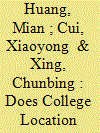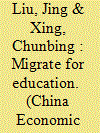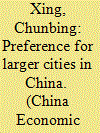|
|
|
Sort Order |
|
|
|
Items / Page
|
|
|
|
|
|
|
| Srl | Item |
| 1 |
ID:
134890


|
|
|
|
|
| Summary/Abstract |
We document the sharp expansion of higher education in China beginning in 1999 and analyze its impacts on the unemployment of college graduates, using nationally representative population surveys from 2000 and 2005. We show that the expansion policy has increased the probability of college attendance among high school graduates. Using a difference-in-difference strategy, we find that China's expansion policy has sharply increased the unemployment rate among young college graduates, and that the unemployment rate for college graduates increases more in non-coastal (especially central) regions than in large coastal cities. We suggest that encouraging regional mobility of college graduates and increasing matching quality can potentially reduce the unemployment rate at the national level.
|
|
|
|
|
|
|
|
|
|
|
|
|
|
|
|
| 2 |
ID:
186223


|
|
|
|
|
| Summary/Abstract |
Based on a representative survey of new college graduates in China, we present a job location choice model that allows for a self-selection effect in college regions by considering region-dependent heterogeneous preference for job locations and unobservable location features. We also treat endogenous housing costs using the method developed by Berry et al. (1995). Our estimation results show that college education significantly increases graduates' likelihood of working in the city where their college is located. However, a model that does not consider the self-selection effect overestimates this impact. The impact of college location on a graduate's migration decision varies considerably across cities. There is significant heterogeneity between students from universities of different tiers and rural versus urban areas. Meanwhile, the graduates show a marked home preference when choosing their job locations, and they tend to avoid working in cities with high housing costs. These findings shed light on debates on place-based higher education policies and spatial distribution of human capital with a high level of education.
|
|
|
|
|
|
|
|
|
|
|
|
|
|
|
|
| 3 |
ID:
161880


|
|
|
|
|
| Summary/Abstract |
China's unemployment rate for new college graduates has increased significantly in recent years, and many people attribute this increase to the higher education expansion policy. In this paper, we use three nationally representative data sets for 2000, 2005, and 2010 to investigate the short and medium term effects of the expansion policy on the unemployment of college graduates. Treating higher education expansion as an exogenous shock and using a difference-in-difference (DID) strategy, we find that this policy increased the unemployment rate of new college graduates in the short run, but the unemployment rate kept declining and the dis-employment effect mostly disappeared after five years. We also find some heterogeneous effects by gender, region, and city.
|
|
|
|
|
|
|
|
|
|
|
|
|
|
|
|
| 4 |
ID:
147622


|
|
|
|
|
| Summary/Abstract |
A large number of village primary schools in rural China were closed since the 1990s. This paper studies the impact of the reduction in the number of primary schools on the migration decision of rural residents. First, using China Health and Nutrition Survey that contains information on community characteristics, we find that both the disappearance of village primary school and the increased distance to nearby primary school increased the migration probability of village residents. Second, using the 1% population survey in 2005 and prefecture level information, we find that the decline in the number of primary schools between 2000 and 2004 increased the migration probability of rural residents. Exploring the heterogeneous effects, we find that the migration of individuals with primary-school-age children is more sensitive to the relocation of primary schools, and that the effect is stronger for families with boys than those with girls. These results suggest that human capital investment motive and regional education policy play an important role in China's urbanization process.
|
|
|
|
|
|
|
|
|
|
|
|
|
|
|
|
| 5 |
ID:
159033


|
|
|
|
|
| Summary/Abstract |
China has long aimed to restrict population growth in large cities but encourages growth in small and medium-sized cities. At the same time, various government policies favor large cities. We conjecture that larger cities in China offer a better quality of life and more opportunities. We thus predict that a typical rural-urban migrant is willing to give up some income in order to live in a larger city. We present a simple model in which rural-urban migrants choose destination cities to maximize utilities from consumption and urban amenities. Drawing data from a large-scale population survey conducted in 2005, we first estimate each migrant's expected earnings in each possible destination city using a semi-parametric method to correct for potential selection bias. We then estimate the typical migrant's preference for city population size, instrumenting population size with its lagged values to control for potential omitted-variables bias. From these estimation results, we calculate the typical migrant's willingness to pay to live in larger cities. Our results show that indeed rural-urban migrants strongly prefer cities with larger populations. We explore possible explanations for this preference and discuss the implications of these findings.
|
|
|
|
|
|
|
|
|
|
|
|
|
|
|
|
| 6 |
ID:
112715


|
|
|
|
|
| Publication |
2012.
|
| Summary/Abstract |
We use three waves of urban household survey from 1995 to 2007 to investigate the trends of residual inequality and its determinants. First, we find that the enlargement in both the overall and residual inequality was larger at the upper half of the wage distributions between 2002 and 2007. Between 1995 and 2002, however, it is the lower half that experienced larger increase in inequality. Second, by using two complementary semi-parametric methods, we find that composition effect is negligible. Instead, the change in skill prices plays a dominant role in the rise of residual inequality. Finally, by constructing a panel data at the city level, we find that ownership restructuring is an important factor that has caused the skill price to rise, especially in the earlier period. Another finding is that China's export share of GDP has a positive effect on the enlargement of residual wage inequality, especially in the period from 2002 to 2007.
|
|
|
|
|
|
|
|
|
|
|
|
|
|
|
|
|
|
|
|
|